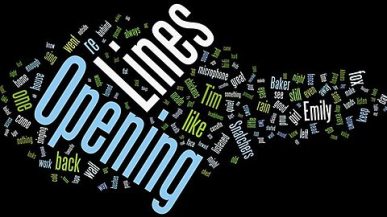Every year BBC Radio 4 runs a short story competition called Opening Lines. The deadline for 2015 is 13th February. The three winners get their story broadcast on BBC Radio 4, and they get to see it being professionally recorded.
Last year my story – Baker, Emily and Me – was one of the three winners. You can read it here.
I haven’t been told why the judges picked my story over the hundreds of entries they received, but I sometimes wonder if it had something to do with the fact that I cut my writing teeth on short stories which I had to read aloud to an audience. Eight years ago I started writing pieces for a short story event held at my local library – Winchester Discovery Centre. People signed up to write a five minute story and read it out to a paying audience. On the night, after all the stories had been read, the audience voted, and the winner and the second-placed writer got a share of the door’s takings. I came second a few times, and once I came first. I probably earned £15.87. But it wasn’t about the money; it was about the experience: getting immediate feedback on what an audience likes (or doesn’t) and understanding what works when writing is read aloud.
Short stories which will be listened to, need different considerations to those which will be read on paper or screen. A listener, unlike a reader, has no opportunity to go back and re-read and so the writer has to think about things differently. Here are some of the things I considered when I wrote Baker, Emily and Me:
- Don’t introduce too many characters at once.
- You can start in the middle of the action, but don’t assume your listener will know where they are or what’s happening. At some point make sure your story gives them an indication of location, time period, age of characters etc.
- Don’t have too much dialogue. (When a story is read by one voice, the listener can’t easily distinguish between characters, and won’t know who said what – especially if there are more than two characters speaking.)
- Keep the story moving forward. Going off on a tangent for a long section or giving too much back-story can make your listeners lose the thread.
- Keep flashbacks to a minimum, or at least keep them short, interspersed with the main forward-moving story. Too many flashbacks can also mean listeners lose the thread.
- Don’t be too subtle. OK, you don’t need hand everything to your listener on a plate, but remember they can’t go back to see how the beginning of your story ties in with the ending; they have to keep the whole story in their head with just one hearing.
- Stick to the guidelines for word length or timing. Opening Lines is very specific – between 1,900 words and 2,000 words – because stories need to fit into a specific scheduling slot.
- Read your story aloud to yourself (many times), and then aloud to someone who has never read or heard it before, to check they can follow it.
Winning Opening Lines was an amazing experience. I loved sitting in the recording studio, and of course hearing my story broadcast. (Here’s a short blog post I wrote at the time.)
I would urge anyone to enter. You never know who will be listening…

I am thinking of entering, so thanks for these brilliant tips Claire, and congratulations on your win!
LikeLike
Thanks Joanna. Good luck if you do enter.
LikeLike
This is a brilliant help Clare… I’d always just wrote short stories to be read but after joining a writer’s group I’m having to change my approach as the stories are read aloud.
LikeLike
It definitely does make a difference.
Claire
LikeLike
Your story is lovely. I imagine there aren’t that many post-apocalyptic short stories, so it would have stood out right from the start – never mind the strength of the writing, which is clear to see.
LikeLike
Ahh, thank you very much!
Claire
LikeLiked by 1 person
Good advice, Claire. I was shortlisted for Opening Lines one year – it must have been thrilling to win. It’s such a pity that there are so few radio opportunity for writers these days – good luck to all entering this year.
LikeLike
That must have been exciting too. Yes, the radio opportunities are dwindling.
Claire
LikeLike
This is fantastic. Thank you, Claire!
I remember listening to and loving your story. I’ll go and read it now.
LikeLike
Thanks Sonya. Good luck if you enter this year.
LikeLike
This is such good advice and I did mean to try this this year, but I think I have left it too late now. I have been distracted by necessary DIY and getting back to my non-fiction research and rewriting.
LikeLike
Thanks, Hilary. There’s always next year…
LikeLike
Fantastic story, Claire – had my heart in my mouth (is that the right expression?!) as I read.
LikeLike
That’s perfect! Thanks for reading, and I’m really glad you enjoyed it.
Claire
LikeLike
LOVE the idea of that short story event. Hmm. Wonder if I could organise something similar in my town?
LikeLike
It was great fun. You should try it.
Claire
LikeLike
Reblogged this on christopherjfgibson and commented:
I was shortlisted 2015 …My story Brother’s Keeper…Two lads from Cumberland seeking their fortune in Arizona Circ. 1910…Unexpected turn-around!
LikeLike